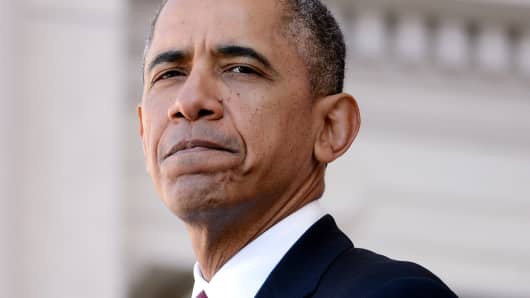International trade agreements signed since the 1960s have turned a U.S. trade surplus into a $480 billion deficit—destroying millions of jobs in industries that pay above the average, like manufacturing, and once-offered opportunities to citizens, many with only a high-school education.
(Read more: Why Obama is spent — and why that's bad for Hillary)
The theory behind free trade is simple and compelling: Let each country export more of what it does best and use the proceeds to purchase imports. New exports will create jobs for displaced workers facing foreign competition and increased productivity will finance higher wages.
The theory does require that workers displaced by imports find new jobs in export industries. That requires more or less balanced trade—a detail lost on the framers of U.S. trade policy in Democratic and Republican administrations alike.
Productivity in U.S. export industries is about 11-percent higher than in import-competing industries. U.S. exports are about $2.2 trillion, yielding a productivity gain from trade of about $240 billion. However, the above-mentioned deficit costs the U.S. economy at least twice that much in lost GDP, and adds at least 5 million to the ranks of the unemployed.
Americans get along borrowing from China and others, employing additional workers in restaurants, dry cleaners and other establishments that do not compete with imports. In fact those are the very kinds of activities that have been growing most rapidly during the recent recovery but pay the lowest wages.
(Read more: Obama personally apologizes for Americans losing health coverage)
U.S. immigration policies make it worse. President Obama has aggressively focused deportation policies on undocumented immigrants with criminal records. Although employer verification programs can work well in manufacturing and other large scale service enterprises that cooperate, a visit to many construction sites or most homes with a cleaning service indicate they don't do much good in smaller businesses, especially when jobs move from place to place or are predominantly part-time without benefits.
Essentially, most undocumented immigrants who don't break the law can avoid deportation. When they have a child in America, they become de facto permanent residents, because we are not the sort of society that separates parents from young children.
Failure to truly enforce immigration policies pleases Hispanic citizens, who generally vote Democratic, and this pleases President Obama. However, it drives down the wages of the hard working semi-skilled Americans the president professes to help.
Moreover, the aggressive taxation of U.S. corporations and small businesses organized as limited liability companies (LLCs) further discourages investment in jobs creation. Although those taxes redistribute income — for example through expanded Medicaid coverage and Affordable Care Act insurance subsidies — those also reduce the demand for labor and wages.
Much the same can be said for Affordable Care Act mandates requiring insurance policies to broaden benefits (and hence charge higher premiums) and businesses with more than 50 employees to provide coverage or pay a penalty in 2015.
The president pushes free-trade-seeking deals with the European Union and through the Trans-Pacific Partnership, but those talks won't do much good if, like past trade agreements, those result in more imports than exports — and they likely will.
At the core of the free trade-unemployment nexus are currency imbalances — foreign currencies whose values against the dollar are purposefully pinned down by government intervention in currency markets — such as the all important Chinese yuan and Japanese yen. Those make foreign cars and goods at Wal-Mart artificially less expensive.
Sixty senators and 200 members of the House have sent letters to President Obama asking him to include currency manipulation in the TPP but the administration is strongly resisting those requests.
In the end, the administration will bring Congress agreements that make the trade deficit worse, and continue to advocate more investments in America — roads and schools.
The latter are important but won't help a lot if they merely provide shipping lanes to get more Asian goods to U.S. store shelves without creating comparable exports to help employ all those better-educated Americans.
—By Peter Morici
Peter Morici is an economist and professor at the University of Maryland's Smith School of Business, and a widely published columnist. Follow him on Twitter @pmorici1.


